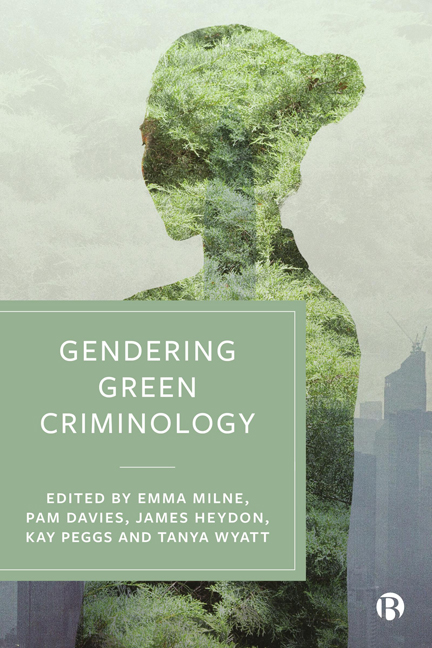12 - Women’s Experiences of Environmental Harm in Colombia: Learning from Black, Decolonial and Indigenous Communitarian Feminisms
Published online by Cambridge University Press: 28 March 2024
Summary
Introduction
This chapter interrogates the gendered impacts of environmental harm in Colombia. Following intersectional theory as developed by Crenshaw (1989), we focus on Colombia's Indigenous and Afro-descendent communities, who are placed in a particularly disadvantaged position due to both gendered and ethnoracialised systems of oppression (Tovar-Restrepo and Irazabal, 2014). To do so, we bring green criminology into conversation with the decolonial, Black and Indigenous feminism that has emerged from across the Americas as a way of exposing the connections between gendered harms and structural violence. In doing so, we wish to highlight how platforming and learning from this feminist scholarship and activism can lead to a more nuanced understanding of environmental harm and its legacies in Colombia.
The chapter proceeds as follows. The next section provides the research context for this chapter. We highlight the range of theoretical perspectives which have been adopted to interrogate the continuum of environmental harms perpetrated in Colombia and outline how we feel engagement with feminist scholarship can enhance green criminological knowledge in this area. In the third section we outline the continuum of environmental harm in Colombia, focusing on its impacts on Indigenous and Afro-descendent populations. We detail how Colombia's colonisation established harmful and exclusionary practices of land dispossession, which in turn lay the groundwork for one of the longest running conflicts in the Western world. We then turn to the environmental legacies of that conflict, before considering how demobilisation and ‘peace’ have created contemporary challenges from illegal and state-sanctioned extractivism. We highlight the sustained resistance to environmental harm in Colombia, and the increasing risks that environmental defenders face. In the fourth sections we turn to the feminist literature, drawing out four key insights regarding gendered environmental harm: first, the theorisation of the connections between territorial and female bodily autonomy; second, the exposure of the gendered vulnerabilities associated with dispossession and forced displacement; third, the ‘everyday’ gendered nature of environmental harms; and fourth, the important role of women in resisting environmental injustice and protecting their communities and territories.
Theorising gendered experiences of environmental harm in Colombia
Colombia is one of the most biodiverse countries in the world. Over half of Colombia's territory is covered in natural forest, including part of the Amazon rainforest (Bickerton, 2017), and 50 per cent of the world's moorlands are in Colombia (San Pedro, 2019).
- Type
- Chapter
- Information
- Gendering Green Criminology , pp. 229 - 250Publisher: Bristol University PressPrint publication year: 2023



